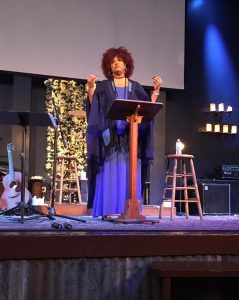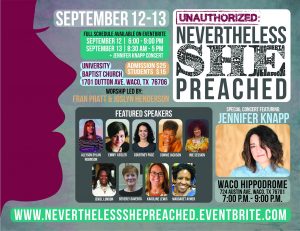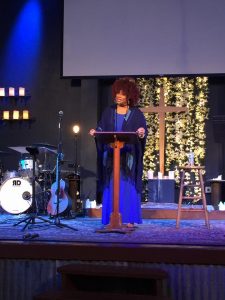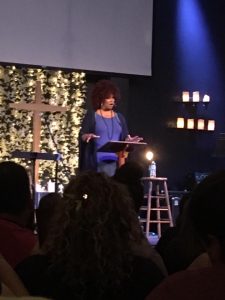Trauma Informed Preaching: A Case Study of Jezebel

 Rev. Dr. Irie Session gave a compelling presentation, “Trauma Informed Preaching: A Case Study of Jezebel,” at the “Unauthorized: Nevertheless, She Preached” event. Rev. Dr. Session, a womanist preacher and theologian and ordained Disciples of Christ pastor, currently serves as Director of Training & Spiritual Support for New Friends New Life, an organization that restores and empowers formerly trafficked girls and sexually exploited women and children.
Rev. Dr. Irie Session gave a compelling presentation, “Trauma Informed Preaching: A Case Study of Jezebel,” at the “Unauthorized: Nevertheless, She Preached” event. Rev. Dr. Session, a womanist preacher and theologian and ordained Disciples of Christ pastor, currently serves as Director of Training & Spiritual Support for New Friends New Life, an organization that restores and empowers formerly trafficked girls and sexually exploited women and children.
The “Me, Too” campaign, recently gone viral on social media but originally created by a black woman named Tarana Burke 10 years ago, further underscores the urgency of Rev. Dr. Irie’s message about women’s universal experience of the trauma of abuse. She connects traditional patriarchal readings of biblical texts to the abuse of women, as do many who tell their “Me, Too” stories. She emphasizes reinterpreting biblical texts so that they empower instead of oppress women. “When we preach Good News,” she says, “we must make sure it’s Good News for everyone in the house, because everyone has experienced some trauma.”
 As a womanist preacher and theologian, Rev. Dr. Irie empowers women and dismantles patriarchy. Womanism, she says, is “situated in the intersections of race, class, and gender oppression and recovers black women as equal partners,” and womanist preaching is “trauma informed.” Trauma informed womanist preaching asks this question: “Who experiences trauma and who dishes it out?” Trauma informed womanist preaching examines “what happens to people, not what’s wrong with people.” Womanist preaching “is prophetic because it exposes patriarchal oppression in certain biblical texts.” Womanist preaching mines biblical texts for “women’s self-love, communal concerns, strength, resiliency, creativity, and ingenuity.”
As a womanist preacher and theologian, Rev. Dr. Irie empowers women and dismantles patriarchy. Womanism, she says, is “situated in the intersections of race, class, and gender oppression and recovers black women as equal partners,” and womanist preaching is “trauma informed.” Trauma informed womanist preaching asks this question: “Who experiences trauma and who dishes it out?” Trauma informed womanist preaching examines “what happens to people, not what’s wrong with people.” Womanist preaching “is prophetic because it exposes patriarchal oppression in certain biblical texts.” Womanist preaching mines biblical texts for “women’s self-love, communal concerns, strength, resiliency, creativity, and ingenuity.”
 Rev. Dr. Irie urges us to recognize that “there is trauma in the pews; people are hurting; people are wounded.” Because what we “say behind the pulpit has great power, we must take care how we preach the texts.” She asks, “Will our preaching repair or revictimize survivors of trauma?” This is a question she hopes to ask every week for the rest of her life.
Rev. Dr. Irie urges us to recognize that “there is trauma in the pews; people are hurting; people are wounded.” Because what we “say behind the pulpit has great power, we must take care how we preach the texts.” She asks, “Will our preaching repair or revictimize survivors of trauma?” This is a question she hopes to ask every week for the rest of her life.
In her preaching and teaching Rev. Dr. Irie empowers women by re-examining biblical stories. She believes in the power of the Bible to bring death or life. On her website she explains: “I believe the church has traditionally interpreted and taught the Bible in a manner that devalues women and girls. Such interpretations adversely affect their survival and ability to experience wholeness. As a result, certain biblical passages have become death dealing for women and girls. As a womanist, I am committed to the survival and wholeness of entire people. Therefore, I teach the Bible to liberate both men and women. I teach the Bible to highlight God’s love for every human being. I teach the Bible to summon life from dead places. I teach for resurrection.”
At the “Nevertheless, She Preached” event, Rev. Dr. Irie re-examines the story of Jezebel, one of the most misunderstood and despised women in the Bible. According to the CEB Women’s Bible, Jezebel has become a symbol for “uncontrolled female power and unrestrained sexuality,” even though the Old Testament story portrays her as a “devoted spouse.” Like many other biblical females, Jezebel has long been defamed, demeaned, and misinterpreted. The name “Jezebel” has been used as a derogatory epithet to denounce and shame women. When Rev. Julie Pennington-Russell became the first woman to pastor a Baptist church in Texas, outside protesters came with picket signs that referred to her as “Jezebel.”
Rev. Dr. Irie reclaims and revalues Jezebel as a woman who “resisted adopting the traditional role of women” in her time. “Even though Jezebel lived in a time when women were voiceless, when daddy could just give you to whoever he wanted to give you to, when you had no rights of your own, she refused to surrender her identity.” Jezebel “refused to take on the religion of her husband,” remaining faithful to her own religion to her death.
Jezebel shows us what a woman can do “when she’s oppressed, put in a box,” Rev. Dr. Irie says. “When we feel oppressed, when we feel that we have no voice, when we feel that we have been subjugated, something within us will rise up. Something will happen in us that we will not feel comfortable with that. Now we may go along to get along for a little while. But something about that just doesn’t feel right, and it ought not feel right because God didn’t make us to be dominated. Something within us will help us rise up and resist.”
Here is a short video clip from Rev. Dr. Irie’s powerful presentation:
This was such an informative session for me. I look forward to more opportunities to hear Dr. Session.
Thank you, Teri, for your comment! I also look forward to more opportunities to hear Dr. Session.
Greetings,
May I have permission to watch the sermon titled ‘A Case Study of Jezebel?’ The vimeo link does not grant me access to the video. If not, may I have a copy of the video? This sounds very interesting to me. Thanks for posting this information.
Greetings, Shandler! Thank you for your comment and question. This video was on the Nevertheless She Preached Facebook page in 2017. I guess they’ve taken it down, and I don’t have it. Please contact Irie Lynne Session or Kyndall Rothaus on Facebook messenger to inquire about this video.